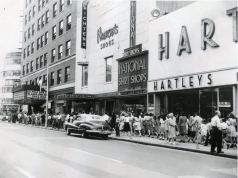Scores of millennial and Gen-Z investors have piled into online brokerages over the past year, in what some are calling a generational-buying spree.
Online brokerages saw new accounts grow as much as 170% in the first quarter, despite the economic downturn and perceived market instability prompted by the coronavirus pandemic.
TD Ameritrade reported 608,000 new accounts in the first quarter, according to an earnings release. E-Trade gained over 363,000 new accounts in the first quarter, a company record, according to their earnings release. Meanwhile, Robinhood saw the biggest increase in new accounts, with over 3 million new users joining the brokerage in the first quarter, first reported by CNBC.
Most of the companies’ new clients were between the ages of 18 and 35, a demographic that previously made up only a small percentage of investors.
Anthony Johnson, a 28-year-old health science doctoral candidate at Nova Southeastern University, joined Robinhood after receiving an invite via text message from a friend.
“I joined the app and bought Bitcoin, not thinking much of it at the time,” Johnson said. “But since then, my investment has multiplied by 10.”
Johnson’s experience with Bitcoin prompted him to become more financially literate and start investing his money in other ways.
“Trading is definitely having a moment, but I think more young people should educate themselves on the markets,” he said. “Now, I’m making long-term investments for my future.”
While some Gen-Zers dabbled in the markets last March, others went into investing full force. Among them were Mariam Alkurdi and Lauren Lindquist, who both dropped out of college to pursue digital entrepreneurship and trading full-time.
“When I decided to not enroll in a semester, it was the scariest decision ever because school had always been a priority to me,” Alkurdi said.
The 22-year-old, originally from West Palm Beach, was studying pre-med at Florida International University. At first, she saw trading as a way to make some extra money. Throughout college, she had to work three jobs to make ends meet. After some success in the foreign exchange markets, Alkurdi realized that trading full time could give her a life of more freedom.
“I wasn’t even really passionate about pre-med. I was just doing it because, number one, it was what I considered the safest and most secure job that I could find from college,” she said. “I also wanted to make my parents proud and meet their expectations.”
Lindquist, 22, also had a similar revelation.
“I always had the misconception that you had to have a lot of money to invest, or already have millions of dollars in order to be an investor,” Lindquist said. “That was kind of what I was told my whole life, but I knew I always wanted to do something where I could make my money work for me.”
She was studying occupational therapy at Florida International University and working two jobs before Alkurdi introduced her to trading. Lindquist said she was depressed before realizing she could change her life, with just a little financial education.
“It was scary, but honestly it was a blessing,” she said. “When I finally told my parents that I didn’t want to do occupational therapy anymore and that I had something that I really enjoyed doing, they saw that. They saw I wasn’t the same person I was six months before, and they were really supportive about it.”
Both of the women are considering finishing their degrees later on to make their parents happy. But both have found success as full-time digital entrepreneurs, and hope to share their knowledge with other young people.
“I would say what it really is, is just an extra source of income,” Alkurdi said. “A lot of people think, ‘oh, it’s not for me, because I don’t see myself making that a career.’ But in reality, most investors aren’t passionate about investing… they use that as a way to fund their dreams.”
Multiple surveys conducted by Gallup over the years have concluded that less than half of young Americans invest their money into the financial markets. But this generational shift, born out of the pandemic, has already made a significant impact on many young people’s lives.
































